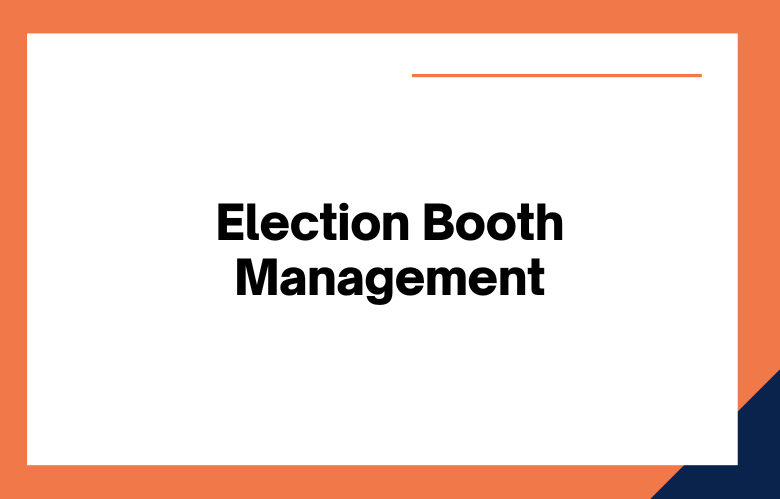Election booth management is a crucial factor in any political campaign. It involves the effective coordination and deployment of resources to ensure a smooth and successful electoral process.
Effective booth management is a crucial determinant of a campaign’s overall success, as it plays a critical role in driving voter turnout, building positive brand recall, and boosting overall voter confidence.
We will explore valuable strategies that successful campaigns adopt in managing their election booths.
What is Election Booth Management?
Election booth management refers to efficiently handling polling booths during an election. It includes several activities, such as the setup and maintenance of the stalls, deployment and personnel management, and ensuring a smooth voting experience for every voter.
The primary goal of election booth management is to ensure fair, transparent, and hassle-free voting for every citizen. Election booth management ensures that polling stations are well-equipped to handle the election process.
This is a crucial aspect of any election, ensuring the voting process is conducted fairly and transparently.
Election booth management covers various activities, from voter registration to vote counting and declaration of results.
We will discuss the strategies that can help to ensure successful campaign management.
Elevating Election Booth Management: Strategies for Successful Campaigns?
Election cycles come and go, and effective election booth management is an essential aspect of running a successful campaign.
The election booth is a strategic location where potential voters can interact with candidates and their teams. Proper booth management can increase voter engagement and possible votes.
We will explore election booth management and provide strategies for successful campaigns.
Understanding Election Booth Management: Proven Strategies for Successful Campaigns?
Election booth management is a critical aspect of any political campaign that seeks to maximize electoral success. With increased voter turnout and competition in election cycles, campaigns must have thorough strategies for managing the booth.
I will explore what election booth management entails, the strategies for successful campaigns, and how to implement them.
Planning for Election Day:
Planning is crucial to ensure that the election day runs smoothly. Political campaigns must prepare for the unexpected by having backup plans.
Preparations should include an election-day checklist outlining all the materials and resources required for a successful campaign. This checklist ensures that nothing is left behind at the campaign office.
Campaigns should consider forming an experienced Election Day Committee capable of overseeing every aspect of the polling process.
Voter Awareness Strategies:
Voter awareness strategies that ensure every registered voter knows their voting rights and the importance of voting are crucial.
Campaigns should use various mediums such as social media, banners, and flyers to reach out to voters and educate them on voting procedures, locations, and how to cast their votes.
Campaigns should establish voter hotlines that connect voters to live agents who can provide information and answer any voter inquiries.
Recruiting Poll Workers:
The efficiency of the voting process depends on the competency of polling workers. As such, campaigns must prioritize recruiting and training poll workers to avoid or minimize mishaps that can arise.
Poll workers’ responsibilities include checking voter credentials, providing clear instructions, and ensuring that voters cast their ballots on the appropriate machines.
When selecting poll workers, campaigns should prioritize those with excellent communication skills and a strong background in customer service.
Know Your Opponent:
To achieve electoral success, it’s imperative to understand the competition and spot the opponent’s strengths and weaknesses.
A good election booth management strategy is deploying campaign volunteers, a.k.a. “poll watchers,” to observe and report unusual incidences.
Poll watchers can report any attempts to suppress voters, such as intimidation, concealing polling locations, or false advertising about polling procedures. Campaigns should have a response plan that guides reacting to any possible threats.
Post-Election Day Activities:
It’s essential to consolidate your gains after an election. Campaigns should have a plan for thanking their supporters and reminding them of their civic duties after the election.
Every voter favoring a specific candidate was a potential donor, volunteer, or campaign promoter.
A good election booth management strategy involves using information collected during the campaign’s preparation to thank and remind voters of the campaign’s position on various issues.
Strategies for Successful Campaigns?
Please set up a Booth Management Team:
The first step in effective booth management is a dedicated personnel team. Establish clear roles and responsibilities for each group member to avoid confusion or overlapping duties.
Key roles in this team include booth supervisors, data entry clerks, volunteers, and security personnel. The team should focus on training and be familiar with the electoral guidelines and processes.
Voter Communication:
Communication plays a crucial role in voter turnout. It’s essential to have a well-coordinated communication strategy to engage voters.
The communication strategy should involve various channels such as SMS, email, social media, phone calls, and targeted ads.
The messages should also be timely and informative. For example, the booth division team can send reminders to their voters about election day, polling stations, and other times. A simple message, for example, can read, “Don’t forget to vote; your voice counts!”
Crowd Control:
Managing large crowds at polling stations can sometimes be challenging. The booth management team should develop an effective crowd-control strategy.
For example, posting clear signs and providing trained personnel to direct voters can help minimize confusion and manage crowds.
In addition, the team should prepare for contingencies, such as equipment failure, supply shortages, and potential security issues.
Consistency in Polling Processes:
Consistency in the polling process is critical to building voter confidence. The booth management team should ensure that polling processes are standardized across all stations, including personnel training.
This will create an environment where all voters have an equal voting opportunity. There needs to be more clarity in the polling process, such as slight variations in polling procedures, to ensure transparency and trust in the overall process.
Data Management:
Data management is an essential component of election management. The booth management team should ensure accurate and timely data entry and processing.
This can provide insights into voter behavior and make it easier to effectively target future campaigning efforts. For example, analyzing voting patterns can help campaigns develop better outreach strategies for future votes.
Conclusion:
Effective booth management is a crucial component of any successful election campaign.
The booth management team should be well-trained and coordinated to ensure that planning is flawless and execution is easy.
Campaigns can adopt the above strategies to raise voter turnout, build positive brand recall, and boost overall voter confidence.
Remember, an election is not won at the polling station, but effective booth management can play a decisive role in determining the outcome.
Call: +91 9848321284
Email: [email protected]











